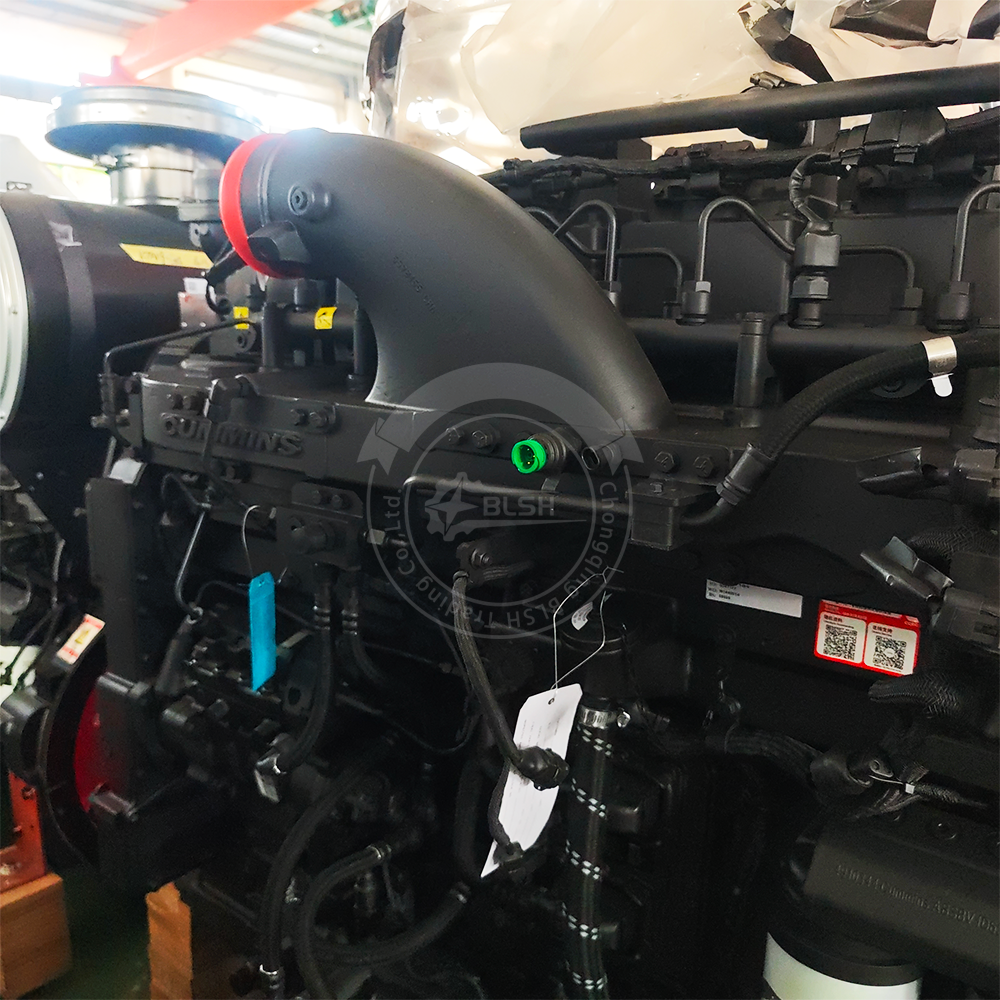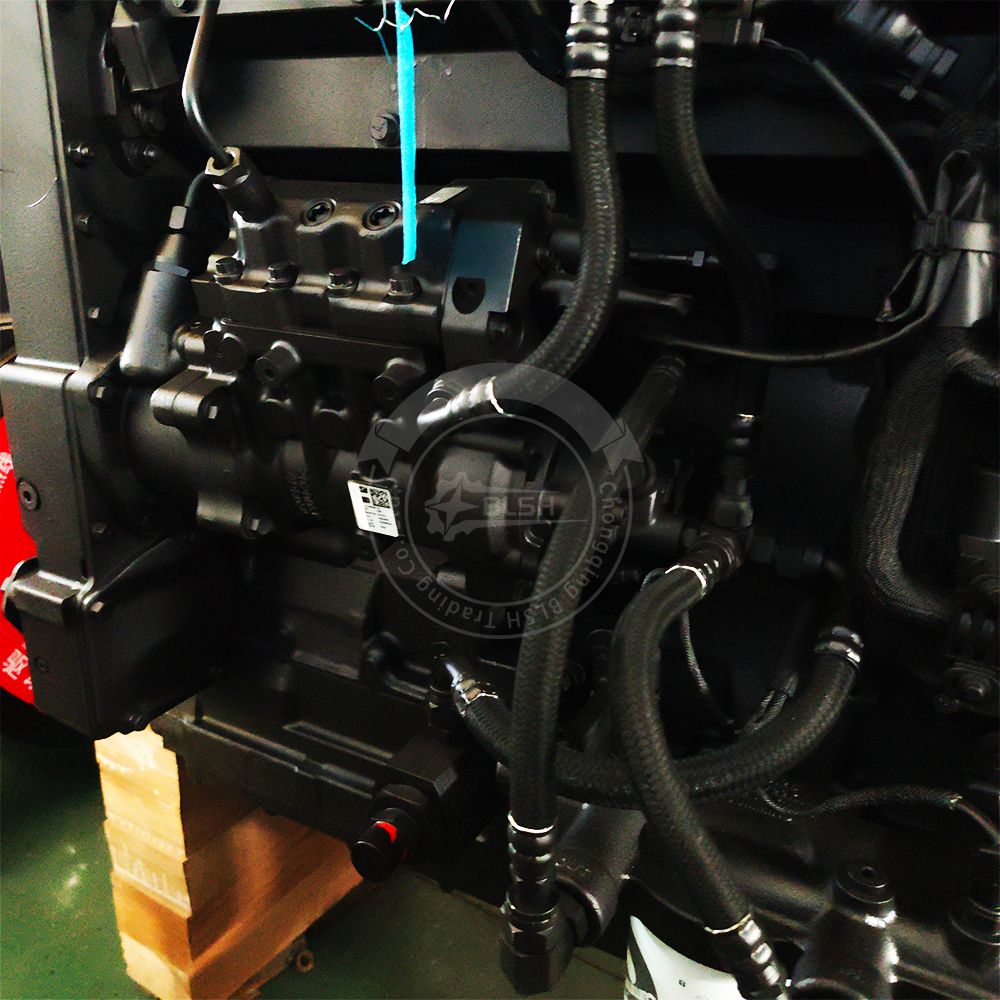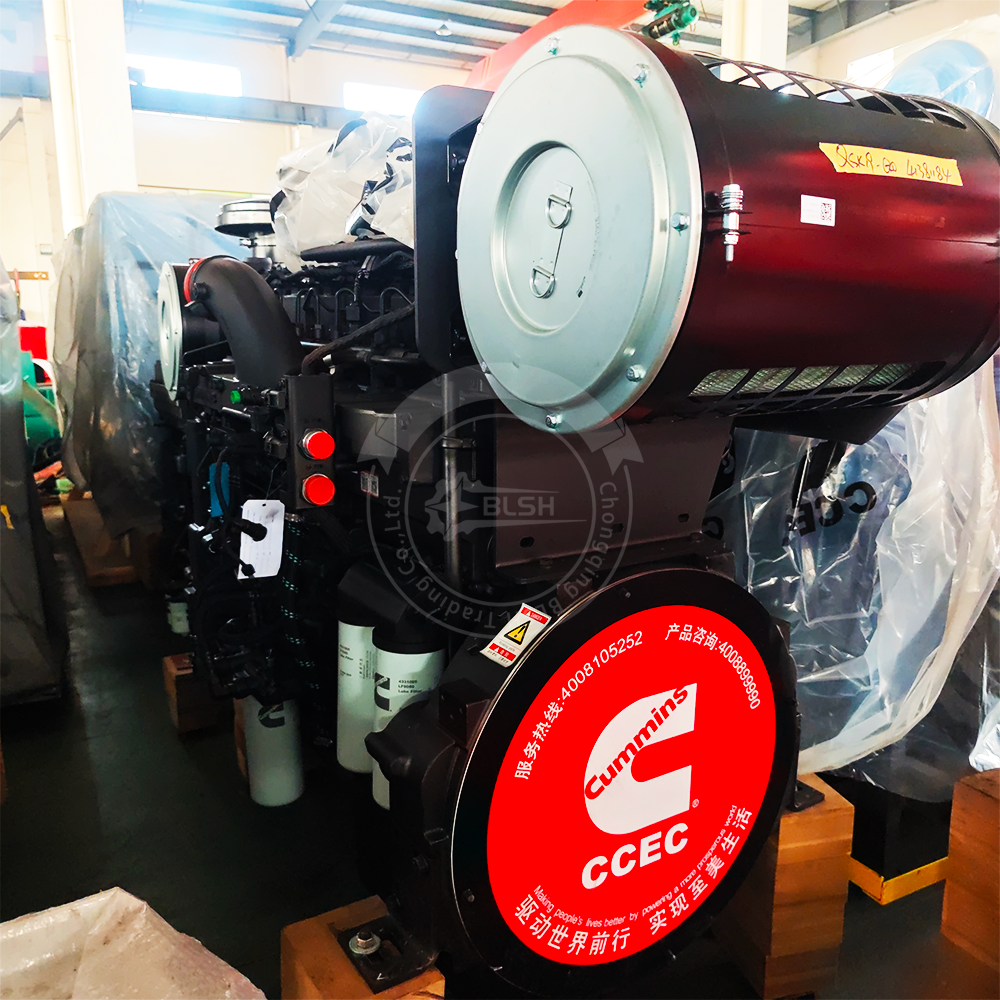CCEC QSK19-G4-A Generator Engines




| Engine Model | QSK19-G4-A |
| Standby Power | 850 HP (634 kW) at 1500 RPM |
| Prime Power | 770 HP (574 kW) at 1500 RPM |
| Compression Ratio | 15.0 : 1 |
| Type | 4 Cycle; 6 Cylinder |
| Fuel System | CMS MCRS |
| Aspiration | Turbocharged & Aftercooled |
| Emission Standard | Euro II |
| Displacement | 19L |
| Bore * Stroke | 159 mm * 159 mm |
| Packing Size (L * W * H) | 1695 mm * 985 mm * 1723 mm |
General Infomation of CCEC QSK19-G4-A Generator Engines
| General Infomation of CCEC QSK19-G4-A Generator Engine | |||
| Engine Model | QSK19-G4-A | Configuration | D193103GX03 |
| Performance Curve | FR4580 | CPL | 4270 |
| Type | Four Cycle; Inline; 6 Cylinder | Aspiration | Turbocharged and Charge Air Cooled |
| Stroke * Bore | 159 mm * 159 mm / 6.25 in * 6.25 in | Displacement | 1150 in3 / 18.9 L |
| Compression Ratio | 15.0 : 1 | Fuel System | CMS MCRS |
| Prime Power & Engine Speed | 770 HP (574 kW) at 1500 RPM | Continuous Power & Engine Speed | 450 HP (336 kW) at 1500 RPM |
| Standby Power & Engine Speed | 850 HP (634 kW) at 1500 RPM | Emissions | U.S. EPA Tier 2 |
| Installation Data of CCEC QSK19-G4-A Generator Engine | |||
| Wet Weight – Fan to Flywheel Engine | 4350 lb / 1973 kg | Dry Weight – Fan to Flywheel Engine | 4190 lb / 1901 kg |
| Date | 16 JAN 13 | Steady State Stability Band at Any Constant Load | +/- 0.25% |
| Moment of Inertia of Rotating Components – with FW 4023 Flywheel | 195 lbm.ft2 / 8.2 kg.m2 | Maximum Bending Moment at Rear Face of Block | 1000 lb.ft / 1356 N.m |
| Center of Gravity from Rear Face of Block | 23.55 in / 598 mm | Center of Gravity Above Crankshaft Centerline | 11.1 in / 282 mm |
| Maximum Static Loading at Rear Main Bearing | 2000 lb / 907 kg | Fan to Flywhee | TBD |
| Excludes Exhaust Noise; at Rated Load and 7.5 m (24.6 ft);1500 RPM | 90.2 dBA | Exhaust Noise at 1 m Horizontally from Centerline of Exhaust Pipe Outlet Upwards at 45°;1500 RPM | 118 dBA |
Engine Performance Data CCEC QSK19-G4-A Generator Engines
| Performance Data of CCEC QSK19-G4-A Generator Engine | |||||
| PRIME POWER | STANDBY | PRIME POWER | STANDBY | ||
| Governed Engine Speed | 1500 RPM | 1500 RPM | Exhaust Gas Flow | 4287 cfm / 2023 L/s | 4425 cfm / 2090 L/s |
| Engine Idle Speed | 700 – 900 RPM | 700 – 900 RPM | Air to Fuel Ratio (air : fuel) | 26.8 : 1 | 24.6 : 1 |
| Gross Engine Power Output | 770 HP / 574 kW | 850 HP / 634 kW | Radiated Heat to Ambient | 3329 BTU/min / 59 kW | 3515 BTU/min / 65 kW |
| Brake Mean Effective Pressure | 354 psi / 2441 kPa | 389 psi / 2682 kPa | Heat Rejection to Jacket Coolant | 12632 BTU/min / 222 kW | 12830 BTU/min / 230 kW |
| Piston Speed | 1562 ft/min / 7.9 m/s | 1562 ft/min / 7.9 m/s | Heat Rejection to Exhaust | 24655 BTU/min / 434 kW | 26095 BTU/min / 460 kW |
| Friction Horsepower | 57 HP / 43 kW | 57 HP / 43 kW | Heat Rejected to Fuel | 232 BTU/min / 4.1 kW | 300 BTU/min / 5 kW |
| Intake Air Flow | 1707 cfm / 806 L/s | 1720 cfm / 810 L/s | Heat Rejected to Aftercooler | 9700 BTU/min / 171 kW | 9355 BTU/min / 165 kW |
| Exhaust Gas Temperature | 953 °F / 512 °C | 960 °F / 515 °C | Charge Air Flow | 122 lb/min / 55 kg/min | 120 lb/min / 55 kg/min |
| Turbocharger Compressor Outlet Pressure | 80 in Hg / 271 kPa | 88 in Hg / 298 kPa | Maximum Expected Compressor Outlet Temperature | 434 °F / 223 °C | 446 °F / 230 °C |
| Engine Water Flow at Stated Friction Head External to Engine (2.5 psi Friction Head) | 162 US gpm / 613 L/min | 162 US gpm / 613 L/min | Engine Water Flow at Stated Friction Head External to Engine (Maximum Friction Head) | 145 US gpm / 549 L/min | 145 US gpm / 549 L/min |
System Technical Data of CCEC QSK19-G4-A Generator Engines
| System Technical Data of CCEC QSK19-G4-A Generator Engine | ||
| Exhaust System | Maximum Back Pressure – 1500 RPM | 1.5 in Hg / 5.1 kPa |
| Air Induction System | Maximum Intake Air Restriction – with Dirty Filter Element | 25 in H2O / 6.2 kPa |
| Maximum Intake Air Restriction – with Normal Duty Air Cleaner and Clean Filter Element 1500 RPM | 10 in H2O / 2.5 kPa | |
| Cooling System | Minimum Pressure Cap | 15 psi / 103 kPa |
| Thermostat (Modulating) Range | 181 – 203 °F / 83 – 95 °C | |
| Coolant Capacity — Engine Only | 11 US gal / 41.6 litre | |
| Maximum Static Head of Coolant Above Engine Crank Centerline | 60 ft / 18.3 m | |
| Maximum Coolant Temperature (Max Top Tank Temp) for Standby / Prime Power | 220 / 212 °F / 104 / 100 °C | |
| Jacket Water Circuit Requirements | ||
| Maximum Coolant Friction Head External to Engine @ 1500 RPM | 5 psi / 34.5 kPa | |
| Charge Air Cooler Requirements | ||
| Maximum Temp. Rise Between Engine Air Intake and Intake Manifold – 1500 RPM | 38 °F / 21 °C | |
| Maximum Air Pressure Drop from Turbo Air Outlet to Intake Manifold – 1500 RPM | 3 in Hg / 10.2 kPa | |
| Maximum Intake Manifold Temperature @ 77 °F (25 °C) Ambient – 1500 RPM | 115 °F / 46 °C | |
| Maximum Intake Manifold Temperature for Engine Protection (Shut Down Threshold) | 180 °F / 82 °C | |
| Lubrication System | Oil Pressure @ Idle Speed | 20 PSI / 138 kPa |
| Oil Pressure @ Governed Speed | 40 – 60 PSI / 275.8 – 413.7 kPa | |
| Maximum Oil Temperature | 250 °F / 121 °C | |
| Oil Capacity with OP 4084 Oil Pan : High – Low | 19 – 17 US gal / 71.9 – 64.4 litre | |
| Total System Capacity (Including Combo Filter) | 22.3 US gal / 84.4 litre | |
| Fuel System | Type Injection System | CMS MCRS |
| Maximum Fuel Inlet Temperature | 160 °F / 71 °C | |
| Maximum Return Fuel Flow @ 1500 RPM | 120 US gph / 454 litre/hr | |
| Maximum Supply Fuel Flow @ 1500 RPM | 75 US gph / 284 litre/hr | |
| Maximum Restriction at Lift Pump (clean/dirty filter) | 5/9 in Hg / 16.9/30 kPa | |
| Maximum Allowable Head on Injector Return Line (Consisting of Friction Head and Static Head) | 10 in Hg / 34 kPa | |
| Electrical System | Cranking Motor (Heavy Duty, Positive Engagement) | 24 volt |
| Maximum Allowable Resistance of Cranking Circuit | 0.002 ohm | |
| Minimum Recommended Battery Capacity-Cold Soak @ 50 °F (10 °C) and Above | 600 0 °F CCA | |
| Minimum Recommended Battery Capacity-Cold Soak @ 32 °F to 50 °F (0 °C to 10 °C) | 640 0 °F CCA | |
| Minimum Recommended Battery Capacity-Cold Soak @ 0 °F to 32 °F (-18 °C to 0 °C) | 900 0 °F CCA | |
| COLD START CAPABILITY | Unaided Cold Start – Minimum Cranking Speed | 150 RPM |
| Unaided Cold Start – Minimum Ambient Temperature for Unaided Cold Start | 10 °F / -12.2 °C | |
CCEC QSK19-G4-A Generator Engines Product Advantages
Outstanding Performance
Equipped with the world-leading high-pressure common rail fuel system and fully electronic control modules, the engine achieves exceptional power and transient response through ultra-high fuel injection pressure, optimized vortex and harmonic intake ports, and Cummins’ proprietary high-pressure-ratio efficient turbocharger. It demonstrates enhanced adaptability to altitude, temperature, and load variations.
Features high torque, robust power, rapid transient response, and superior fuel efficiency.
Excellent Durability
The cylinder block and cylinder head are designed with high-strength integration to minimize failure rates, ensuring long-lasting reliability and an outstanding reputation.
The pre-lubrication system, Centriguard centrifugal filter, CENTINEL continuous oil renewal system, and dual-stage Fleetguard combination oil filter extend maintenance intervals while reducing startup failure rates.
High Reliability
Modular integration, compact structure, low failure rates, reduced vibration, and low noise. The engine maintains optimal performance across varying altitudes and load conditions.
Emission Compliance
An optimized combustion chamber design enables the engine to achieve exceptional emission levels without requiring aftertreatment systems. It has been certified under China’s National Stage III Emission Standard for non-road applications.
Convenient Maintenance
The INSITE engine monitoring and diagnostics software, based on the Windows operating system, offers a user-friendly interface and flexibility for rapid fault diagnosis.
A modular design with compact, block-based integration ensures easy disassembly and component reuse. Shared components across the platform enhance parts commonality.
Six-cylinder single-head integrated design with modularized structure ensures compactness. Components are detachable and highly reusable.

